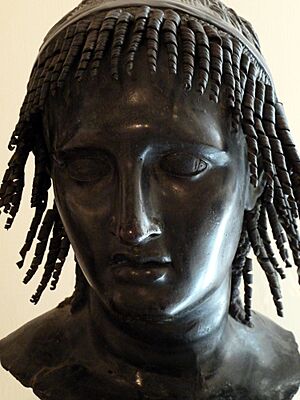Ptolemy Apion facts for kids
Quick facts for kids Ptolemy Apion |
|
|---|---|

Portrait of Ptolemy Apion from Herculaneum, presently located at the National Archaeological Museum, Naples.
|
|
| King of Cyrene | |
| Born | 150-145 BC Cyrene (?) |
| Died | 96 BC |
| Greek | Πτολεμαῖος Ἀπίων |
| House | Ptolemaic dynasty |
| Father | Ptolemy VIII Physcon |
| Mother | Eirene of Cyrene |
Ptolemy Apion (pronounced TOH-leh-mee AY-pee-on), also known simply as Apion, was a Greek king who lived a long time ago, from about 150-145 BC to 96 BC. He was the very last Greek king of a place called Cyrenaica, which is in modern-day Libya.
Apion made a big decision for his country. He separated Cyrenaica from the larger Ptolemaic Kingdom of Egypt. When he died, he left his entire kingdom to the powerful Roman Empire. He was part of a famous royal family called the Ptolemaic dynasty.
Who Was Ptolemy Apion?
Ptolemy Apion was the son of Ptolemy VIII Physcon, who was a king of Egypt. His father also ruled Cyrene and Cyprus for many years. Apion's mother was Eirene of Cyrene.
Apion was born sometime between 150 BC and 145 BC. He became king of Cyrene around 105-101 BC.
Ptolemy Apion's Reign
Not much is known about Ptolemy Apion's time as king of Cyrenaica. Some historians even wonder if he truly ruled the kingdom himself. What we do know is that he died in 96 BC.
He did not have any children to take over the throne after him. This meant that his family line as rulers of Cyrenaica would end with him.
Leaving Cyrenaica to Rome
Before he died, Ptolemy Apion made a special document called a will. In this will, he decided what would happen to his kingdom after his death. He chose to give Cyrenaica and all his royal lands to the Roman Republic.
This was a very important event. It meant that Cyrenaica, which had been a Greek kingdom for a long time, would now become part of the growing Roman Empire. This decision helped shape the future of the region.
 | Mary Eliza Mahoney |
 | Susie King Taylor |
 | Ida Gray |
 | Eliza Ann Grier |

